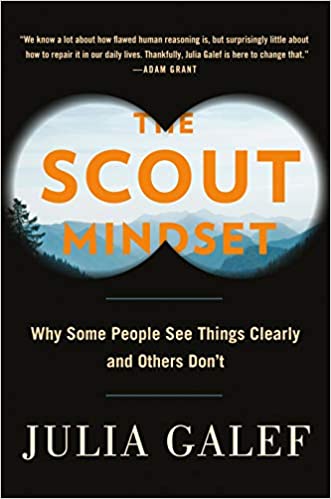You have /5 articles left.
Sign up for a free account or log in.
 The Scout Mindset: Why Some People See Things Clearly and Others Don’t by Julia Galef
The Scout Mindset: Why Some People See Things Clearly and Others Don’t by Julia Galef
Published in April 2021
I'm not convinced that reading lots of books makes anyone any wiser. At least, that has been my experience of book reading. The exception to this reading/wisdom paradox might be the power of books to persuade us about how little we know.
The one thing that I'm sure of -- and I credit my nonfiction book reading habit to this realization -- is that I'm likely getting most things wrong. Well, not just me. All of us.
Read books like Predictably Irrational: The Hidden Forces That Shape Our Decisions (Ariely, 2009), Being Wrong: Adventures in the Margin of Error (Schulz, 2010) and Misbehaving: The Making of Behavioral Economics (Thaler, 2015) and you will be thoroughly convinced of your own blind spots.
The big idea in Julia Galef's engaging new book, The Scout Mindset, is that successful people not only recognize their mistakes and misconceptions -- but that they actively seek them out.
Having a scout mind-set means that you are constantly revising your map of reality. Understanding your blind spots, weaknesses, misconceptions and mistakes is necessary if the goal is to draw an accurate map to navigate the terrain ahead.
What Galef is arguing against in The Scout Mindset is the idea that our illusions about our abilities and behaviors can be beneficial. There is a school of thought that we need to have some measure of misplaced and unearned confidence in our abilities to ultimately succeed.
It might be fine to "fake it till we make it," but Galef argues that we should be clear-eyed in understanding our motivations and abilities.
For Galef, accurate mapmaking around skills and abilities should not be paralyzing, but liberating. We can accept that when it comes to our professional lives, all of us are making it up as we go. Perfection at work should not be the goal. Instead, a better approach is confidence in our ability to do our best and continuously learn from our mistakes.
Some of the best advice in The Scout Mindset comes when Galef discusses how we might uncover our biases and blind spots. She suggests making active efforts to listen to people that we both respect and disagree with.
In practice, this means seeking out colleagues and other sources of information that are connected in some meaningful way to our work and lives and who bring divergent experiences and perspectives to the table.
Placing this advice in an academic context, a progressive humanities professor with a scout mind-set might not want to watch Fox News but look to spend time with colleagues in the econ department or maybe the business school. And vice versa.
If Galef plans to write a follow-up, I hope she takes on more directly issues of power, gender, race and class.
Is having a scout mind-set a luxury of the privileged?
Should those who are reminded daily of their lack of agency and choice in their work (and schooling) also carry the burden of engaging in critical self-reflection?
I don't know the answer to these questions, but I'd read another book by Julia Galef if she decides to take them on.
What are you reading?




